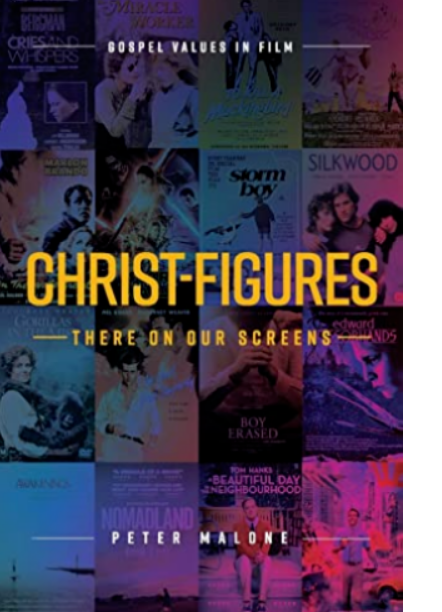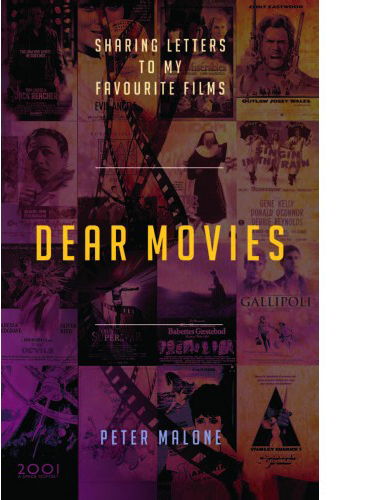Reviews: Christ-Figures There on our Screens by Peter Malone, Dear Movies by Peter Malone
Priest Peter Malone has spent decades reviewing films, searching for ethical themes and Christ-figures, as he calls them – characters who emulate the outlook of Jesus, or who in some way recall Jesus. Malone has written before on Christ-figures; in this new book he updates the topic with recent films, while also revisiting old favourites.
The most obvious Christ-figure in films is of course Jesus himself, but Malone doesn’t spend much time on Jesus biopics. He writes about The Last Temptation of Christ, a controversial film in its time that is now worthy of less sensational contemplation, but says it is not really a ‘gospel’ story – it’s more novelist Nikos Kazantzakis’s imagining of an alternative life of Christ (on which Martin Scorsese based his film), if he hadn’t followed his call through to the end, as well as a more psychological story – something the gospels don’t go into (they are more action-focussed).

Priests should be, obviously, in Christ’s image, but often they are portrayed negatively in recent films. Not surprisingly, when sometimes the church has put power ahead of people, but this is not always the case. Priests can seem somewhat exotic figures in contemporary culture, and can be vehicles for a counter-cultural emphasis on truth, while films can put priests in situations where faith speaks truth to power, as in the classic On the Waterfront.
Malone doesn’t restrict the Christ-figure to males. Helen Prejean (Dead Man Walking, played by Susan Sarandon) may seem an obvious choice, but her strength is in listening rather than judging (just as Jesus listened to those in society on whom judgement usually falls). Although he can’t decide how to spell her name, Malone notes the sacrifice of Katniss, from the dystopian Hunger Games, and the need for fighting for right in a world going to hell.
There are these overturning-the-tables, righteously angry characters, but there are also ‘nice’ – a quality not always attributed to Jesus – figures, like Atticus Finch (who of course is also fighting for justice) and the recent Tom Hanks character in A Beautiful Day in the Neighbourhood. A more otherworldly figure is Edward Scissorhands – a Frankenstein figure (remembering that Frankenstein’s monster was less a monster and more an outcast), and someone who came down from ‘on high’ to the ordinary world, who was vilified for being against the grain, even if that entails kindness.
Malone includes Obi-Wan Kenobi in his list – though one could equally make the case for Luke Skywalker, wrestling with his call and all that (with Han Solo as, possibly, Simon Peter). In considering Star Wars, Malone goes further, equating another member of the Trinity, the Holy Spirit, with the Force.

In his previous book Dear Movies, Malone discusses Clint Eastwood’s characters, from Josey Wales in an early Western (where one could argue about whether the plot is driven by hunger for justice or hunger for revenge) to the lead in Gran Torino, where his character Walt Kowalski is as much a Christ-figure as you could find, offering himself as a sacrifice to obtain justice.
Dear Movies is, like Christ-Figures, a book of short chapters, here employing the odd quirk of, as the title suggests, Malone writing letters to his favourite films, beginning with his absolute favourite, 2001: A Space Odyssey, containing the mysterious, transcendent monolith – a God-like image that is both perfect and unknowable (yet, it might be said, distant from the down-to-earth figure of Jesus).
Malone describes his taste as middlebrow, but he is unafraid to find a spiritual silver lining in more provocatively dark silver-screen manifestations, such as Midnight Cowboy. His aim, he says, is to find the bigger story in the story on the screen. While there is some material about his memories of the theatre experience – memories many of us will associate with – the late night exits and the film lingering, the darkened, curtained rooms – Malone digs deeper, and he looks for, even in films that might be deemed escapist, or in films that dwell on the darker side of life, the way morality operates in that paradigm.
We love films for their artistry, but we can also find explicit or implicit Christian themes – martyrdom, sacrifice, generosity, justice, confrontation of evil, contemplation of suffering, forgiveness and the quiet wonder of love.
Nick Mattiske blogs on books at coburgreviewofbooks.wordpress.com and is the illustrator of Thoughts That Feel So Big.












